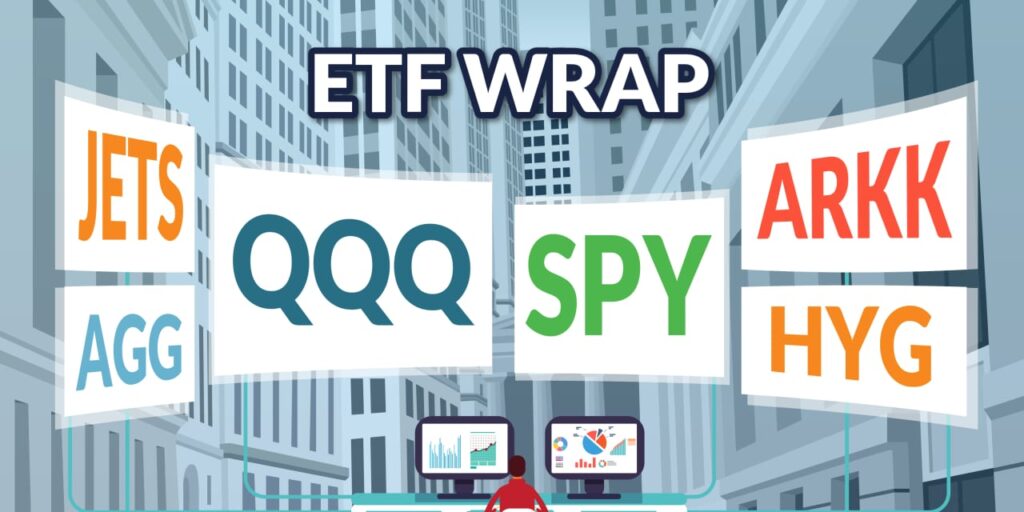Hello! For this week’s ETF Wrap, I spoke to Michael Arone, chief investment strategist for the U.S. SPDR business at State Street Global Advisors, for his view of markets and where ETF investors may look for opportunities at this stage of the Federal Reserve’s interest rate-hiking cycle.
Please send feedback and tips to [email protected] or [email protected]. You can also follow me on X at @cidzelis and find me on LinkedIn. Isabel Wang is at @Isabelxwang.
Sign up here for our weekly ETF Wrap.
Bond-market volatility spilling into stocks in 2023 may also be creating investment opportunities that could pay off in the next year, according to Michael Arone, chief investment strategist for the U.S. SPDR business at State Street Global Advisors.
“When interest rates have this great of impact on the stock market, historically, going forward it’s been a positive sign for stocks,” he said in a phone interview.
Investors may see over the next 12 months a broadening in the participation of in any stock market rally, with a potential recession in that period likely to be short and shallow, according to Arone. He said “the stock market may not be impacted for very long” by such a downturn.
Small-cap and value stocks stand to see some of the biggest gains, said Arone. That’s based on past periods when interest rate volatility rocked markets and similarly led to high dispersion in equities, he said.
The U.S. stock market is being driven by a small group of Big Tech stocks this year, while small-cap companies have lagged and large-cap growth equities have broadly crushed value.
The SPDR Portfolio S&P 600 Small Cap ETF
SPSM
is down more than 4% this year based on Thursday afternoon trading, while the SPDR S&P 500 ETF Trust
SPY
has jumped more than 13%, FactSet data show.
As for value versus growth, the almost 19% surge for the SPDR Portfolio S&P 500 Growth ETF
SPYG
in 2023 has far surpassed the 7.6% gain of the SPDR Portfolio S&P 500 Value ETF
SPYV
based on Thursday afternoon.
Some Big Tech stocks, which include Apple Inc.
AAPL,
Microsoft Corp.
MSFT,
Google parent Alphabet Inc.
GOOGL,
Amazon.com Inc.
AMZN,
Nvidia Corp.
NVDA,
Facebook parent Meta Platforms Inc.
META,
and Tesla Inc.
TSLA,
appear in the top holdings of both the value and growth ETFs.
The largest three weights for the SPDR Portfolio S&P 500 Value ETF were Microsoft, Meta and Amazon as of Nov. 8, according to a list of the fund’s top holdings on State Street’s website. The ETF’s next largest holdings were Berkshire Hathaway Inc.
BRK.B,
JPMorgan Chase & Co.
JPM,
Walmart Inc.
WMT,
and Cisco Systems Inc.
CSCO,
The SPDR Portfolio S&P 500 Growth ETF’s top 10 holdings on Nov. 8 included all the Big Tech stocks except Meta, data on State Street’s website show.
Rising yields in the U.S. Treasury market in recent months hurt stocks, with the S&P 500’s three straight months of declines through October paring its 2023 gains. So far in November, though, Treasury yields have retreated and the S&P 500 has climbed.
Bond market yield moves have had an “exaggerated” impact on the U.S. stock market, said Arone.
The S&P 500 closed Wednesday with an eighth straight day of gains that marked its longest winning streak since November 2021, according to Dow Jones Market Data. The index
SPX
finished lower Thursday though to snap that stretch of gains as Treasury bond yields rose.
The bond market is volatile this year as the Federal Reserve keeps its benchmark interest rate elevated, after slowing its aggressive pace of hikes aimed at bringing down inflation to its 2% target.
The market is anticipating that the combination of the Fed potentially concluding its hiking cycle, falling inflation and a slowing economy will put downward pressure on rates, said Arone.
Long-term Treasurys pare big losses
Rising yields this year have led to steep losses in long-term Treasurys, with investors questioning whether now may be a good time to buy them.
The Vanguard Long-Term Treasury ETF
VGLT
was down 12.5% on a total return basis through October, but as yields declined this month the fund trimmed its year-to-date losses to 8.5% as of Thursday afternoon, according to FactSet data. Bond prices and yields move in opposite directions.
Investors have been trying to discern how long the Fed might keep rates elevated and then eventually begin cutting rates, on the expectation that such a shift in monetary policy would spur a price rally in long-term bonds.
Fed-funds futures points to traders anticipating the Fed may start lowering its benchmark rate in 2024, the CME FedWatch Tool shows.
Arone said one risk to his view that small-cap and value equities could drive a broadening in the stock-market rally is a deeper recession than he is now anticipating. A rise in real interest rates is another risk, he said.
See: Fed maintains freeze on interest rates as it fine-tunes fight against inflation
Short-term Treasury maturities remain the most attractive part of the yield curve with low volatility, but investors may also consider moving into intermediate-term investment-grade corporate credit in order to capture any rally from potential Fed rate cuts, according to Arone.
He said that strategy could involve holding the SPDR Bloomberg 1-3 Month T-Bill ETF
BIL
as well as the SPDR Portfolio Intermediate Term Corporate Bond ETF
SPIB.
Ultra-short-term T-bills are still “a good idea,” but taking on “a little bit” of credit risk may set investors up to benefit from price appreciation should the Fed finish tightening its policy and rates fall, according to Arone.
The SPDR Bloomberg 1-3 Month T-Bill ETF returned a total 4.2% this year as of Thursday afternoon, compared with a 1.8% total return for the SPDR Portfolio Intermediate Term Corporate Bond ETF over the same period, FactSet data show.
Read: Short-term bonds dominate fixed-income ETF flows again in October — with a single fund getting outsize portion of investors’ money
As usual, here’s your look at the top- and bottom-performing ETFs over the past week through Wednesday, according to FactSet data.
The good…
| Top Performers | %Performance |
|
Invesco China Technology ETF CQQQ |
6.4 |
|
ARK Innovation ETF ARKK |
5.4 |
|
ARK Next Generation Internet ETF ARKW |
5.1 |
|
VanEck Vietnam ETF VNM |
5.1 |
|
ARK Fintech Innovation ETF ARKF |
5.1 |
| Source: FactSet data through Wednesday, Nov. 8. Start date Nov. 2. Excludes ETNs and leveraged products. Includes NYSE, Nasdaq and Cboe traded ETFs of $500 million or greater |
…and the bad
| Bottom Performers | %Performance |
|
United States Natural Gas Fund LP UNG |
-10.3 |
|
First Trust Natural Gas ETF FCG |
-8.3 |
|
SPDR S&P Oil & Gas Exploration & Production ETF XOP |
-8.1 |
|
United States Oil Fund LP USO |
-7.9 |
|
iShares U.S. Oil & Gas Exploration & Production ETF IEO |
-7.0 |
| Source: FactSet |
New ETFs
- Avantis Investors announced on Thursday the launch of the Avantis U.S. Mid Cap Equity ETF AVMC, Avantis U.S. Mid Cap Value ETF AVMV and Avantis Emerging Markets Small Cap Equity ETF AVEE.
- Janus Henderson Investors said Thursday that it launched the Janus Henderson Securitized Income ETF JSI, an actively managed fund that expects to invest in areas including asset-backed securities, commercial mortgage-backed securities, collateralized loan obligations, mortgage credit and agency mortgage-backed securities.
-
Simplify Asset Management said Nov. 7 that it launched the Simplify MBS ETF
MTBA,
which will seek to invest in mortgage-backed securities that provide “attractive” yields versus comparable U.S. Treasuries while carrying “little” credit risk. -
The Bahnsen Group said Nov. 7 that it launched the TBG Dividend Focus ETF
TBG,
which aims to invest in publicly traded companies with “a long history of growing their dividend.”
Weekly ETF reads
Read the full article here













